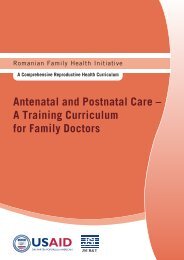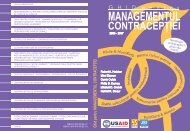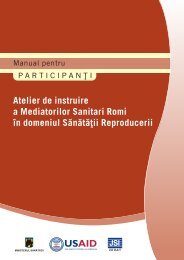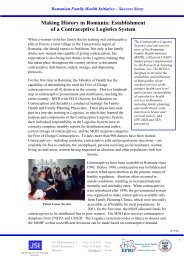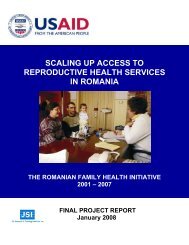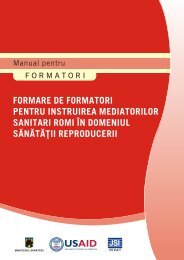Training of Roma Health Mediators in Reproductive Health
Training of Roma Health Mediators in Reproductive Health
Training of Roma Health Mediators in Reproductive Health
Create successful ePaper yourself
Turn your PDF publications into a flip-book with our unique Google optimized e-Paper software.
Tra<strong>in</strong>er document<br />
MYTHS ABOUT BREASTFEEDING<br />
Myth: "You have to dr<strong>in</strong>k a lot <strong>of</strong> milk to produce more milk."<br />
Fact: It is not true. Any type <strong>of</strong> food and fluids taken <strong>in</strong> by the mother <strong>in</strong> adequate<br />
quantity is sufficient to produce milk. The production <strong>of</strong> breast milk is not dependent on<br />
the milk <strong>in</strong>take by the mother. The baby's suckl<strong>in</strong>g on the breast is also important, "more<br />
suckl<strong>in</strong>g- more milk."<br />
Myth: "Small breasts will not produce enough milk."<br />
Fact: Be<strong>in</strong>g able to breastfeed successfully does not depend on the size <strong>of</strong> the woman’s<br />
breast. The size <strong>of</strong> the breasts depends upon the fatty tissue layer under the sk<strong>in</strong>. Special<br />
sacs <strong>in</strong> the breast, which are present <strong>in</strong> all women, produce breast milk.<br />
Myth: "You have to stop eat<strong>in</strong>g certa<strong>in</strong> foods dur<strong>in</strong>g breastfeed<strong>in</strong>g."<br />
Fact: The woman can cont<strong>in</strong>ue eat<strong>in</strong>g most <strong>of</strong> her favorite foods dur<strong>in</strong>g breastfeed<strong>in</strong>g.<br />
Though some people report problems with different food, many others don't have any<br />
problems with the same k<strong>in</strong>d <strong>of</strong> food. If the woman is worried about a particular food, she<br />
may eat a small amount each time and see whether it causes any problem to her baby. If it<br />
really bothers her baby every time she eats it, she should quit eat<strong>in</strong>g this food.<br />
Myth: "Work<strong>in</strong>g with cold water will affect the milk supply."<br />
Fact: This is not true. Some people believe that it may cause cold to the baby but it does<br />
not.<br />
Myth: "If you were not able to breastfeed your first baby, you won't be able to breastfeed<br />
successfully this time."<br />
Fact: Mothers can be successful <strong>in</strong> breastfeed<strong>in</strong>g their babies even if they were not able<br />
to breastfeed the first baby, so it is important to be confident.<br />
Myth: "Mother's milk 'comes <strong>in</strong>' after three days."<br />
Fact: One may say that it actually starts flow<strong>in</strong>g freely by the third day but the yellowish<br />
milk (colostrum) starts com<strong>in</strong>g out as early as baby starts suckl<strong>in</strong>g and it is sufficient for<br />
baby's demands for the first three days.<br />
Myth: It is not practical to fully breastfeed the baby.<br />
Fact: Once the mother has clearly understood the benefit for her baby and herself and she<br />
is determ<strong>in</strong>ed to fully breastfeed her baby, it is not difficult to do so.<br />
Myth: If the mother fully or nearly fully breastfeeds her baby, she will become very<br />
weak and malnourished.<br />
Fact: If the mother clearly understands the dictum “feed the mother to feed the baby”<br />
and takes a well balanced diet, she will rema<strong>in</strong> healthy and successfully breastfeed her<br />
baby.<br />
161<br />
RFHI/JSI <strong>Roma</strong>nia <strong>Tra<strong>in</strong><strong>in</strong>g</strong> <strong>of</strong> RHMs <strong>in</strong> <strong>Reproductive</strong> <strong>Health</strong> Session 9: Breastfeed<strong>in</strong>g



